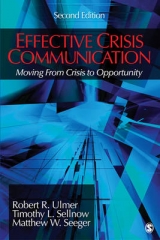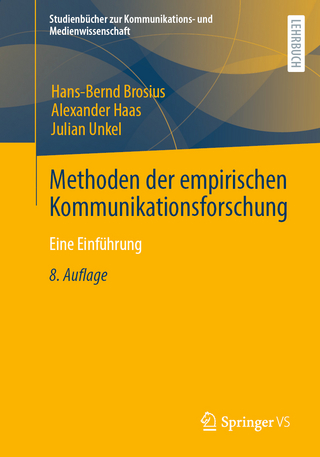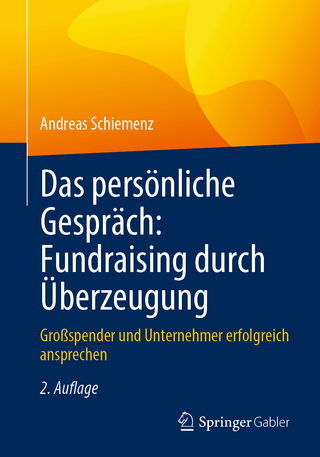
Effective Crisis Communication
SAGE Publications Inc (Verlag)
978-1-4129-1419-2 (ISBN)
- Titel erscheint in neuer Auflage
- Artikel merken
- Keith Michael Hearit, Western Michigan University
Effective Crisis Communication: Moving from Crisis to Opportunity provides the reader practical advice on how to effectively manage and overcome a crisis. Authors Robert R. Ulmer, Timothy L. Sellnow, and Matthew W. Seeger provide guidelines for taking the many challenges that crises present and turning those challenges into opportunities for overcoming a crisis. Key Features of this book:
- Brings together theory and experience: This book introduces readers to sound research and best practices in the field of crisis communication. Introductory chapters offer practical lessons on managing uncertainty, effective crisis communication, and productive crisis leadership that help readers evaluate case studies in later chapters.
- Provides advice on how to create opportunity from crisis: Unlike other crisis communication texts, this book explains how organizations can and should emerge from crises as better organizations. Examples and lessons on how to capitalize on the opportunities inherent to crisis are provided through organizational learning, sound ethical practices, and risk communication. In addition, the book provides advice on how to create renewal and growth following a crisis.
- Addresses prominent and diverse cases: Cases and practical applications from a wide variety of crises are included, such as food-borne illness outbreaks, terrorism, industrial disasters, and natural disasters. ôYou Make the Callö exercises allow readers to examine and critique the decisions made in such important cases such as 9/11, Malden Mills, and the 2003 California fires.
The combination of practical lessons with vivid examples makes this a valuable supplemental text for courses in crisis communication from the perspectives of public relations, health communication, risk communication, and cusiness communication. In addition, it serves as an excellent resource for practitioners of crisis and risk communication in industry.
Robert R. Ulmer is professor of Communication Studies and dean of the Greenspun College of Urban Affairs at the University of Nevada, Las Vegas. The Greenspun College of Urban Affairs’ mission is to create unique solutions to support community resiliency. His teaching, research, and advisory roles focus on producing effective risk and crisis communication through renewal, growth, and transformation. His current work involves creating transdisciplinary research solutions and engaging public/private partnerships to develop crisis-prepared and response-capable communities and organizations. Recently, the Greenspun College of Urban Affairs launched the MGM Resorts International Public Policy Institute. The Institute is bipartisan (the co-chairs are former Senator Harry Reid and former Speaker John Boehner) and focuses on creating innovative solutions to pressing national social crises. He is also involved in several research initiatives focused on tourist safety, smart cities, urban leadership, community trauma, and community resiliency. His recent and current work is funded by MGM Resorts International, the Centers for Disease Control and Prevention, and the Environmental Protection Agency. He has worked in an advisory role both nationally and internationally for a wide variety of public and private organizations during risk and crisis events. He has served as an advisor on several large-scale oil spills, issues of homeland security and terrorism, financial crises, environmental disasters, food safety crises, and public health and community crises. He has published articles in Management Communication Quarterly; Journal of Applied Poultry Research; Communication Yearbook; Journal of Business Ethics; Public Relations Review; Journal of Organizational Change Management; Journal of Applied Communication Research; Handbook of Crisis Communication, Argumentation, and Advocacy; Public Relations Review; Communication Studies; Handbook of Risk and Crisis Communication; Encyclopedia of Public Relations; International Handbook of Crisis Communication; Handbook of Crisis Communication; and Handbook of Public Relations. Timothy L. Sellnow is a professor of strategic communication in the Nicholson School of Communication and Media at the University of Central Florida in Orlando. Dr. Sellnow’s research focuses on instructional risk and crisis communication to diverse publics, and strategic communication for crisis management and risk mitigation in government, organizational, and health settings. He has conducted funded research for the Department of Homeland Security, the United States Department of Agriculture, the Centers for Disease Control and Prevention, the Environmental Protection Agency, the United States Geological Survey, and the World Health Organization. He has also served in an advisory role for the National Academy of Sciences and the Food and Drug Administration. His work on crisis, risk, and communication has appeared in the Handbook of Crisis and Risk Communication; International Encyclopedia of Communication; Communication Yearbook; Handbook of Public Relations; Handbook of Applied Communication Research; Public Relations Review; Communication Studies; Journal of Business Ethics; Journal of Business Communication, Argumentation, and Advocacy; Critical Studies in Media Communication; Journal of Applied Communication Research; Health Communication; Journal of Health Communication; Risk Analysis; Journal of Contingencies and Crisis Management; and Management Communication Quarterly. Dr. Sellnow is the coauthor of six books and coeditor of two books on crisis and risk communication, and he is the past editor of the Journal of Applied Communication Research and past recipient of the National Communication Association’s Gerald M. Phillips Award for Distinguished Applied Communication Scholarship. Matthew W. Seeger is currently professor of communication and co-director of the Center for Emerging Infectious Diseases at Wayne State University. Dr. Seeger’s research concerns crisis and risk communication, health promotion and communication, crisis response and agency coordination, the role of media—including new media—crisis and communication ethics, failure of complex systems, and post-crisis resilience and renewal. He has worked with the U.S. Centers for Disease Control and Prevention for more than a decade. He is a member of the World Health Organization Guidelines Development Group for Emergency Risk Communication. He has consulted with several Fortune 500 firms on crisis management planning and response. His work has been supported by the CDC, NCFPD, NSF, NIH, and the State of Michigan, with over $7 million in extramural funding. His work on crisis, risk, and communication has appeared in more than 100 peer reviewed articles and book chapters including the Handbook of Crisis and Risk Communication, International Encyclopedia of Communication, Journal of Health Communication Research, Health Promotion Practice, Communication Monographs, International Journal of Crisis and Contingency Management, Communication Yearbook, the Handbook of Public Relations, Handbook of Applied Communication Research, Communication Monographs, Public Relations Review, Communication Studies, Journal of Business Ethics, Journal of Business Communication, Management Communication Quarterly, Journal of Applied Communication Research, and the Journal of Organizational Change Management, among several others. Seeger is the author or coauthor of eight books, most focusing on crisis and risk communication, including Communication and Organizational Crisis (2003), Crisis Communication and the Public Health (2008), Effective Crisis Communication (2007), Effective Risk Communication (2009), Theorizing Crisis Communication (2021), Crisis and Emergency Risk Communication (Second Edition, 2015), Narratives of Crisis: Stories of Ruin and Renewal (2016), and the International Handbook of Crisis Communication (2016). He has advised over 40 doctoral dissertations.
PART I: THE LESSONS
Chapter 1. Defining Crisis Communication
Chapter 2. Lessons on Managing Crisis Uncertainty
Chapter 3. Lessons on Effective Crisis Communication
Chapter 4. Lessons on Effective Crisis Leadership
PART II: APPLYING THE LESSONS
Chapter 5. Examples of Success and Failure In Industrial Accidents
Chapter 6. Examples of Success and Failure During Outbreaks of Food-Borne Illness
Chapter 7. Examples of Success and Failure in Response to Terrorism
Chapter 8. Examples of Success and Failure During Natural Disasters
PART III: THE OPPORTUNITIES
Chapter 9. Learning Through Failure
Chapter 10. Risk Communication
Chapter 11. Responding to the Ethical Demands of Crisis
Chapter 12. Crisis as Inspiring Renewal to a New Normal
Index
About the Authors
| Erscheint lt. Verlag | 26.9.2006 |
|---|---|
| Verlagsort | Thousand Oaks |
| Sprache | englisch |
| Maße | 152 x 228 mm |
| Gewicht | 280 g |
| Themenwelt | Sozialwissenschaften ► Kommunikation / Medien ► Kommunikationswissenschaft |
| Wirtschaft ► Betriebswirtschaft / Management ► Unternehmensführung / Management | |
| ISBN-10 | 1-4129-1419-1 / 1412914191 |
| ISBN-13 | 978-1-4129-1419-2 / 9781412914192 |
| Zustand | Neuware |
| Haben Sie eine Frage zum Produkt? |
aus dem Bereich



